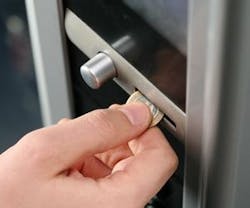Critical Energy Conservation Appliance Standards Completed
U.S. Energy Secretary Steven Chu announced on Sept. 1 that the Department of Energy has completed energy-efficiency standards for a critical group of appliances that, once in effect, will save up to 1.1 billion metric tons of carbon dioxide. The standards were completed with the publication of the energy-efficiency standard for beverage vending machines in the Federal Register – the vending machine standard is the last of the five energy conservation standards that President Obama highlighted in his memorandum to DOE in February.
This is the first time the Department of Energy is regulating energy consumption for vending machines used in the United States. The final rule, which will take effect in 2012, will reduce carbon dioxide emissions by up to 9.6 million metric tons from 2012 to 2042 – the rough equivalent of removing over 2 million automobiles from the road for a year – and will save commercial customers of the machines between $38 million and $52 million per year over the same time period. The efficiency standards apply to both glass-front type and solid-front type beverage vending machines commonly found in office buildings, schools, colleges, retail sites, and manufacturing facilities.
DOE has also released energy conservation standards for dishwashers, general service incandescent lamps, microwaves, electric and gas kitchen ranges and ovens, general service fluorescent lamps, incandescent reflector lamps, commercial boilers, and air conditioning equipment this year. Each of the final standards was issued on time and ahead of any applicable deadlines.
“These energy efficiency appliance standards will play an important role in lowering energy use in homes and businesses across the country,” says Secretary Chu. “By improving the energy efficiency of each of these appliances – from lighting to ovens to vending machines – we can save money, reduce carbon pollution, and increase our energy security.”
To ensure the appliance standards are as effective as possible, the Department of Energy will work to aggressively and consistently enforce energy efficiency standards across the country.
